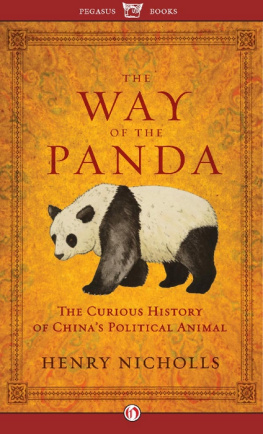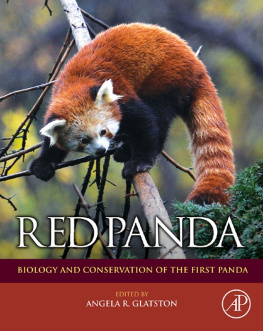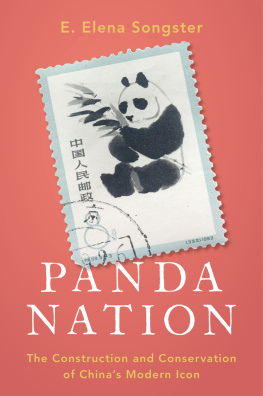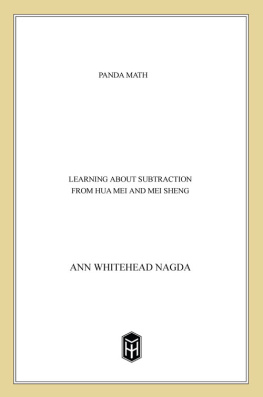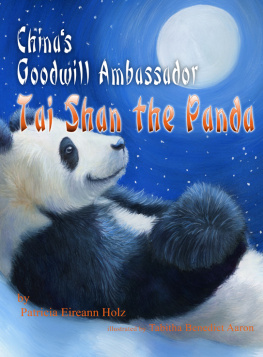Henry Nicholls - The Way of the Panda: The Curious History of Chinas Political Animal
Here you can read online Henry Nicholls - The Way of the Panda: The Curious History of Chinas Political Animal full text of the book (entire story) in english for free. Download pdf and epub, get meaning, cover and reviews about this ebook. year: 2011, publisher: Pegasus Books, genre: Detective and thriller. Description of the work, (preface) as well as reviews are available. Best literature library LitArk.com created for fans of good reading and offers a wide selection of genres:
Romance novel
Science fiction
Adventure
Detective
Science
History
Home and family
Prose
Art
Politics
Computer
Non-fiction
Religion
Business
Children
Humor
Choose a favorite category and find really read worthwhile books. Enjoy immersion in the world of imagination, feel the emotions of the characters or learn something new for yourself, make an fascinating discovery.
- Book:The Way of the Panda: The Curious History of Chinas Political Animal
- Author:
- Publisher:Pegasus Books
- Genre:
- Year:2011
- Rating:3 / 5
- Favourites:Add to favourites
- Your mark:
- 60
- 1
- 2
- 3
- 4
- 5
The Way of the Panda: The Curious History of Chinas Political Animal: summary, description and annotation
We offer to read an annotation, description, summary or preface (depends on what the author of the book "The Way of the Panda: The Curious History of Chinas Political Animal" wrote himself). If you haven't found the necessary information about the book — write in the comments, we will try to find it.
The Way of the Panda: The Curious History of Chinas Political Animal — read online for free the complete book (whole text) full work
Below is the text of the book, divided by pages. System saving the place of the last page read, allows you to conveniently read the book "The Way of the Panda: The Curious History of Chinas Political Animal" online for free, without having to search again every time where you left off. Put a bookmark, and you can go to the page where you finished reading at any time.
Font size:
Interval:
Bookmark:


PEGASUS BOOKS
NEW YORK
To Edward

APART FROM ITS STRIKING COAT, there is very little that is black and white about the giant panda. Is it more like a bear or a raccoon? How come its a carnivore when its diet is 99 per cent bamboo? How has the species survived for millions of years if (according to popular opinion) it doesnt like sex? How is it that an animal this rare and elusive has become so familiar?
This last conundrum is particularly surprising when you consider that the giant panda was not known outside China (and probably hardly known within China) until 1869. So this species has come from complete obscurity to achieve total global zoological domination in less than 150 years. In fact, it had probably achieved the current popular position it enjoys in human society in less than 100 years. To me, this is truly remarkable.
In a book entitled Men and Pandas, first published in 1966, renowned zoologist Desmond Morris and his wife Ramona speculated on the characteristics that may contribute to the pandas immense appeal. Many of them, like the pandas flattened face, its black eye markings and baby-like body proportions, certainly make intuitive sense. But what I want to understand is how and why the pandas indisputable appeal should have played out the way it did. I want to get to grips with the history of the giant pandawhat I call the way of the pandain as much gritty detail as possible.
I do this for lots of reasons, but primarily because its a super history, just a really good yarn. As a writer, that is pretty much my main concern. I want to write things that people want to read and I am hopefulheck, quietly confidentthat you will enjoy reading about the twists and turns of this extraordinary creature as much as I enjoyed researching and writing about them.
But I explore the way of the panda with other things in mind, too. Given the huge popular appeal of the giant panda, the symbolic role that we have found for this species, its ability to raise capital, the academic effort thats gone in to understanding its biology and the willingness of politicians to commit to its conservation, it is not that surprising that the way of the panda should also reveal a fascinating human history. Like the panda coming from nowhere to become one of the most recognised animal species on the planet, so China has struggled free from Western colonialism to become the self-sufficient, economic giant that it is today. So, rather wonderfully, thinking about pandas helps make sense of modern Chinas rise to global domination.
At the same time, the giant panda is a great muse for reflecting on changing attitudes towards animals and nature that occurred during the twentieth century. We humans have gone from hunting and skinning this animal, to seeking out live specimens to draw eager crowds to our zoos, to making serious efforts to protect it in its natural habitat. In spite of the relatively enlightened position we have reached, however, we still know surprisingly little about this species. There can be no better illustration of this ignorance than the attitudemost commonly encountered in Britain and the United Statesthat the giant panda is a maladapted species that deserves to become extinct. As Chris Catton noted in his excellent 1990 book Pandas, it has long been fashionable to regard the giant panda as an animal ill-suited to its environment, and incompetent in almost every function crucial to its survival.

A captive giant panda munches away on ample bamboo provided by the staff at the Bifengxia Giant Panda Base just north of Yaan City in Sichuan Province.
This sort of argument reached a low point in 2009, when BBC natural history broadcaster Chris Packham went public with his views about the panda. Heres a species that, of its own accord, has gone down an evolutionary cul-de-sac, he told the Radio Times. Its not a strong species. This is quite obviously silly because there have been pandas (or more properly, ancestors that looked very like the panda we know and love) that have been around for many millions of years: thats quite a bit longer than have modern humans. Bamboo, if you can eat it (which pandas have become remarkably good at), is a brilliant thing to settle on as a source of food because in a world without humans (as the world has been for most of the giant pandas evolutionary history), there were masses of this hardy plant throwing out edible shoots all year round. Its true that pandas do sex differently from us, but there is no reason to think that their way of reproducing is any less efficient than ours. None of this sounds like a weak species to me.
But I have learned through experience that no amount of carefully reasoned argument can dislodge this perception of the giant panda as a figure of fun. Its like trying to take on Po, the unlikely hero of the 2008 blockbuster animation, Kung Fu Panda. The measured appreciation of the giant panda that I have is always going to lose out to a big, fat panda that can bounce his opponents to oblivion with his generous girth. So rather than railing against the innocent and sometimes not-so-innocent misrepresentations of the giant panda, I will try instead to understand them. In particular, I would like to know when, where and why the giant panda became fair game for satire. On this, I have some ideas.
I have structured The Way of the Panda in three parts. The first covers eighty years from 1869 to 1949 and is dominated by an almost exclusively Western obsession with pandas: we will learn of the giant pandas formal scientific discovery by a French Catholic missionary in the 1860s, of the (mainly) European interest in what to call this strange animal, of the competition to shoot specimens for (mostly) North American museums and then the race to collect live animals to show off in Western zoos. Throughout this period, China adopts a passive role in the panda story, busy as it was trying to free itself from the grip of Western colonialism, to replace its downtrodden imperial establishment with a new republic and to fight off unbelievable Japanese aggression.
The book pivots around the second, central part, which takes us from 1949 to 1972. Here, we will hear about one particular pandaChi-Chiwhose extraordinary story captures much about this confused period. We will learn of the Cold War tensions that surrounded her journey from China to the West, of her role in the foundation of the World Wildlife Fund in 1961, of attempts to pair her with a Soviet panda, An-An, and of her peculiar but very real life after death. During this period, the Peoples Republic of China begins to assert its ownership of the giant panda, using the species and its image to strengthen its sense of national identity both at home and, appreciating the Wests enthusiasm for everything panda, abroad.
In the third part, which takes us from 1972 to the present, science begins to direct the path of the giant panda. We will see how a pair of animals gifted from the PRC to the United States became the subject of a serious research programme, how China and the West (in the guise of WWF) began to work on pandas in the wild, how zoos and other institutions began to succeed in breeding pandas in captivity and we will contemplate the species future. As this final part progresses, we see China taking control of the future of the giant panda and, perhaps, the future of the world.
Next pageFont size:
Interval:
Bookmark:
Similar books «The Way of the Panda: The Curious History of Chinas Political Animal»
Look at similar books to The Way of the Panda: The Curious History of Chinas Political Animal. We have selected literature similar in name and meaning in the hope of providing readers with more options to find new, interesting, not yet read works.
Discussion, reviews of the book The Way of the Panda: The Curious History of Chinas Political Animal and just readers' own opinions. Leave your comments, write what you think about the work, its meaning or the main characters. Specify what exactly you liked and what you didn't like, and why you think so.

